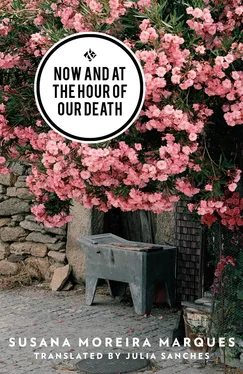Without meaning to, they would speak of him in the past tense. I never knew him, what a pity, they’d say. The man they described was not the man in that bed.
There was something literary about that description. As a matter of fact, the family itself seemed to have been lifted from a novel. Both daughters had left home after arguments with their parents, both had fought for their father’s recognition, both had returned. The older sister, Sara, only made up with her father after he fell ill, and that lost time had aged her. It was not so much that their family history seemed improbable, and therefore more convincing when turned into fiction; it was the way in which matters of life or death had altered the family’s composition.
Sara had once been a hairdresser but now worked with her husband in France. They installed transmission towers along the highway. In the same way she once took note of people’s hair, a quirk of the trade, now, as she drove, she couldn’t help but notice the towers along the highway and the electrical wires that cut across the windows and against the sky or the land.
After dinner, feeling slightly tipsy, Elisa showed me the room she’d lived in as a teenager. On the walls hung photos of her posing with friends, cutouts of exhibitions she had participated in, and even an article from a national newspaper about how odd it was for a young goth to be staging an exhibition in Mogadouro, one of Portugal’s most remote towns. The room felt nostalgic to her now because, at thirty-one, she felt she could no longer exhibit herself so brazenly on the walls; or perhaps it seemed particularly nostalgic to me because, being little older than Elisa, I had long felt embarrassed about putting my own world on display.
As we walked down the stairs, I noticed the painting again, the long black hair. Elisa and her dark mane walked down the steps in front of me, without saying a word. I didn’t know if the picture had been painted many years ago or just a few, but it seemed to me a portrait of Elisa now and not one of her at the time it had been painted.
Would Sara drive through the night, or stop to sleep along the way? Either way, she would feel afraid in the night.
The picture I imagine Elisa painting with her back to me, this unfinished portrait, could be as much a portrait of herself as one of her father. I’m reminded of those nineteenth-century photographers who would photograph bodies at the moment life left them, their eyes still open. These portraits would then be placed alongside earlier photographs, creating a certain continuity between the living and the dead. With the magical new technology of daguerreotypes, photographers could even make the dead visible long after the body itself had disappeared. They made white, chalky figures appear in family portraits, at times no more than a veil hovering over the image, a form of communication both artificial and sincere.
Sara was afraid of waking up to find her father had died during the night and that she had not made it in time to say goodbye. In any case, she knew that even if she did make it — and even if he lasted months instead of weeks, and she kept returning, on time, every fortnight — there would still always be something left to say.
It was daybreak when Elisa hugged me at the door. She asked after my father and told me to enjoy his company as much as I could. Nursing a hangover the following day, what struck me the most from the night before was the conversation we’d had by her front door, just as I was leaving. I couldn’t stop thinking of how — and it had always been clear — we are the others.
That week, Sara made it in time to see her father alive, but not to speak with him as they had spoken before. He was incomprehensible. No one could tell whether the drugs were making him hallucinate, whether he was asleep and dreaming, or whether this was just the way men died.
I never met him — ‘What a pity,’ Sara said. She, the older daughter, once again described an exceptional man, but one who would only be remembered by his family and, for a while at least, in the village and in Mogadouro. All I could see was a body lying on a bed.
When Sara arrived, Elisa had already left for Ovar, where she interned at a courthouse. The two sisters didn’t cross paths, but in some strange way it was as if they were always together, and I can’t think of one without remembering the other. They were almost opposites, almost rivals, but they shared the intensity of difficult love.
Sara was not as I had pictured her: a face of sharp corners, almost cubist, more fraught than her sister’s, and even her mother’s.
And so now it’s Sara and her mother who are in the kitchen, and Elisa who is missing from the scene.
The last time I visited the village of Figueira, just a few weeks before Rui Ferreira’s death at the age of fifty-six, Sara showed me her father’s office. On his desk stood a computer, and on the shelves stood books, family photos, and Topo Gigio dolls. He’d been nicknamed Topo Gigio and he liked the name so much he’d had business cards printed with the tv puppet on them. Instead of the name ‘Ferreira’ there was a picture of a big-eared mouse on the mailbox next to his front door.
After their father’s death and after the funeral, Sara stopped traveling between France and Portugal every fortnight. And yet I still can’t help but picture her in a car, permanently in transit. She never stops leaving.
Later, the house in Figueira was left vacant, a still life.
Last time I saw Elisa, she was wearing a tank top and jeans. Her hands were dirty and the toolbox lay open — she’d just finished installing a shower in the bathroom of their new apartment in Porto. The afternoon light struck the dust floating in the living room, making it visible, magical. It was very hot on that early October day and her mother sat on the sofa fanning herself with a magazine. She was tired. She had slept poorly, having dreamt her husband wanted to go back to work again and that he was angry with her for having thrown away his work clothes.
As we spoke, Elisa lit one cigarette after another. Nicha, the cat, crawled into her lap, and Elisa petted her as she talked about her father and about the details of his funeral without once saying: death, died, dead. I kept hearing the words she’d said that morning, standing at her front door in Figueira: we are the others.
Sara
I’ve cried a lot over being so far away. I spent all those years claiming I didn’t miss a thing. I’d come to Portugal once a year, because I had to. I’d come to see my parents, not the country.
In my head, my parents were young. I couldn’t picture them being old. If my dad was eighty, like my father-in-law, who died recently, I’d think, well, that’s normal… If he was old. But he isn’t old. My dad’s always been in good shape. I even thought that maybe he was just making it all up to see if I really loved him. That he’d asked my mother to lie to me — to see if I’d come, because we’d been fighting.
I don’t believe you,
that’s what I’d say to him, to keep him quiet, to stop him from telling me those things. And he’d say
look, it might be this or it might be that
and I’d say
no, no, no, it’s nothing.
Then he read me his test results. I came back here, to visit him, convinced it wasn’t true. And I could see he wasn’t well, but he didn’t seem as sick as they’d said. As far as I was concerned, it was everything but cancer — that was impossible. I don’t know how it was that I woke up one day and saw things for how they really were. My dad’s always grabbed the bull by the horns. It was us who didn’t want to face the facts. He wanted us to cooperate, but we just wanted to hold on to hope. Not that he’d be saved, necessarily, but that he’d at least live a few more years. We’d heard of people with his kind of cancer who’d carried on living for two or three years — or even four or five more. We’re always waiting on a miracle. Like, what if tomorrow there’s a test that shows he’s been cured? Even though the doctors are always saying there is no cure… But we just carry on hoping for a miracle.
Читать дальше












